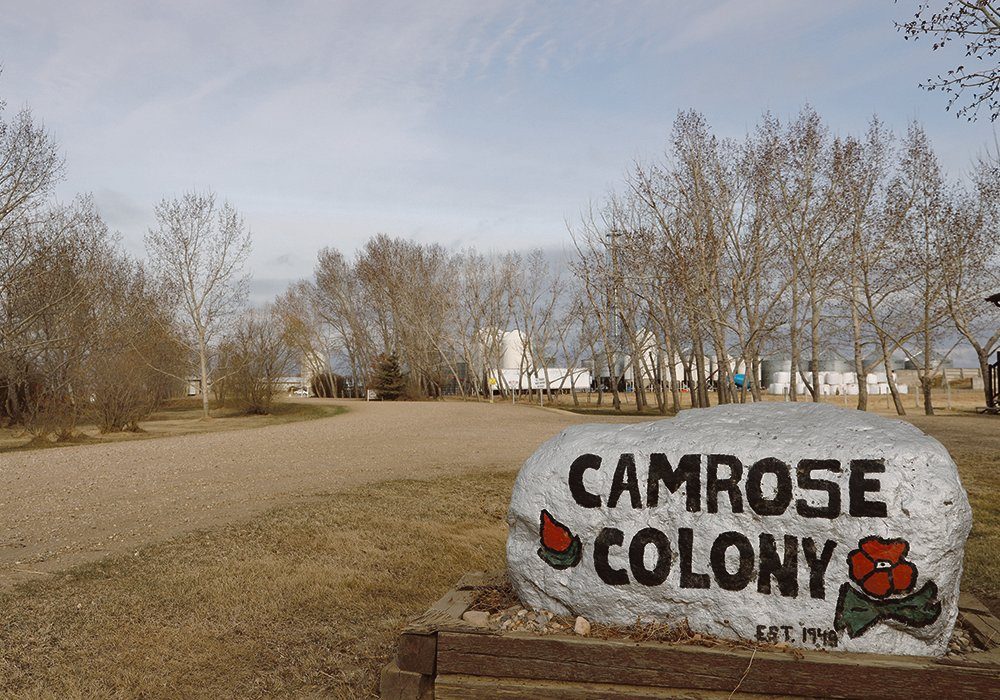Long-time colony boss finds time to retire

Mike Tschetter of the Camrose Colony has retired from his job as farm boss but not from helping out where he’s needed
CAMROSE, Alta. — After 48 years as farm manager, Mike Tschetter has retired, sort of.
While Tschetter is no longer making the daily farm decisions on the Camrose Hutterite Colony he still works at the jobs he likes.
“I do what I like to do and I like what I do,” said Tschetter, 79.
Like most retired farmers, he drives around to inspect the crops and the livestock and offers advice at the morning meetings, but most days, Tschetter spends time in the leather shop helping make gloves, saddles, halters and other leather projects.
“For the next 48 years, I’m going to work in the leather factory,” said Tschetter.
“It’s a slow pace. We don’t hurry ourselves.”
With his knees worn out after years of hard work, he told the minister it was time to find another farm manager for the Camrose Colony.
After two knee replacements and a five-week stint in the hospital to recover, Tschetter has more time to slow down and focus on his health. He takes vitamins and garlic oil tablets daily.
“I can feel what I need.”
Tschetter said because there are always jobs to do on a colony, the older members often do the lighter chores like mowing grass, watering trees, gardening, or cleaning. For others it is a time to travel and visit friends and relatives.
Depending how you feel will dictate the retirement on the colony, he said.
“You work for free. It’s something you do on your own decision and want to do, if your health permits.”
Tschetter said working in the colony’s leather shop is a treat, not a hardship. The large building with heated floors, good tools and good company is a nice way to spend the day. On a regular day he gets to work by 9 a.m. and leaves by 3:30 p.m.
“It is a beautiful facility for retirement.”
The thought of sitting at home doing nothing does not appeal to Tschetter.
“If your mind gives up, your body gives up. Sitting down would be the wrong thing for me. I don’t just sit in the house and look out the window.”
Instead, Tschetter helps fill orders in the leather shop.
“There is a lot of work making gloves.
Retirement on the colony looks different for everyone, he said. Recently his sister, 91, passed away. Her daughter was released from her other colony responsibilities to look after her mother.
Caring for each other from birth to death is part of life and retirement on the colony.
Everyone gets healthy meals three times a day and if they want to work, there is always light work to do.
“If you wish, you can visit your daughter or friends. If you like to travel, you can go to visit friends in Saskatchewan. The relatives are pretty well everywhere. I like to stay at home,” he said.
“Sometimes a person gets old and pieces begin to wear out. If anyone is sick, we take care of them. I, myself, don’t want a home or a hospital to look after me. We look after our own from cradle to grave.
Women in the colony are always cleaning or sewing, even in retirement, he said.
“Cleaning is number one. They clean all the time. Sometimes my daughter cleans the house and it doesn’t need cleaning.”
Reading, singing, visiting and helping each other with projects also keep retired members busy, he said.
Like most colonies, Camrose colony is diversified with dairy, beef, poultry, hog, a slaughter facility, garden and store along the highway. With more than 100 people on each colony, it means there are many electrical bills and expenses from each operation, and the colony managers rely on the expertise of elders during the morning meetings.
“I join that meeting every morning because I have a lot of experience. That is helping out.”
When everything is working, you have a profitable end of year and have a nice income, he said.
“A colony needs a lot of little creeks that run together to make a good river.”
Source: www.producer.com

